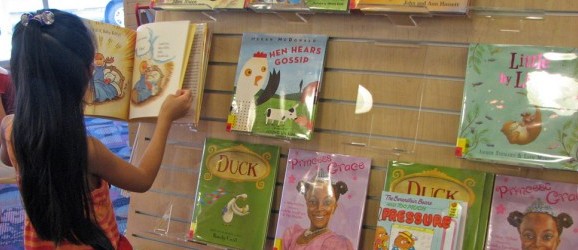Dearth Of Racial Diversity In Children’s Books Is Terrible: Depressingly Unsurprising
Vital Information for Your Everyday Life

In unsurprising (yet still disheartening) news, racial representation in children’s literature sucks.
According to a report from Cooperative Children’s Book Center at the University Wisconsin-Madison, there were some disturbing trends in racial representation in children’s books for the publishing year of 2012. Out of the thousands of books they received, only 8% were written by or about someone of color. EIGHT percent. Not even a tenth.
Those aren’t the only statistics worth considering. Laura Beck of Jezebel writes:
…Recent data from the Census Bureau indicates that nearly half of today’s children under five years old are non-white — so those concerns (real or imagined) can’t last much longer.
Half of all children under five are not being acknowledged by the media specifically made for them. How messed up is that?
We spend a lot of time here at the Mary Sue discussing women in storytelling, so you understand how powerful it is to see stories that have a fleshed out, three-dimensional character that shares some of your attributes. We know how frustrating it is to pick up a random video game in a store and see that it has only one female character (if one at all) whose only purpose is a background motivation, a fridged relation or a damsel in distress. In games like this, women– realistic, defined, agentic women– are being erased.
Likewise, think of a child going into a library and looking through the books, and not seeing anyone who looks like them. All of the covers have animals or little white girls and boys. It is the same phenomenon– their experiences aren’t being acknowledged. Growing up with that concept, developing a self-image with that concept, trying to navigate a world that constantly sends you the message that you are not worth portraying in any story– that’s not okay.
I think that this sort of ignorance is particularly egregious in children’s literature for that reason. As adults, we have a better capacity for thinking and rationalizing and understanding that the stories around us are not infallible. We know that stories come from people, and that people are flawed. For a child, who doesn’t understand that adults aren’t all-powerful and that stories aren’t just as accurate a representation of the world as anything else is, convincing them that they don’t matter enough to be acknowledged is eviscerating.
Melinda Machado, latina mother of 8-year-old Havana, put it like this:
I think children today are told, ‘You can be anything.’ But if they don’t see themselves in the story, I think, as they get older, they’re going to question, ‘Can I really?’
Children’s literature seems to say: “no.”
Are you following The Mary Sue on Twitter, Facebook, Tumblr, Pinterest, & Google +?
Have a tip we should know? [email protected]